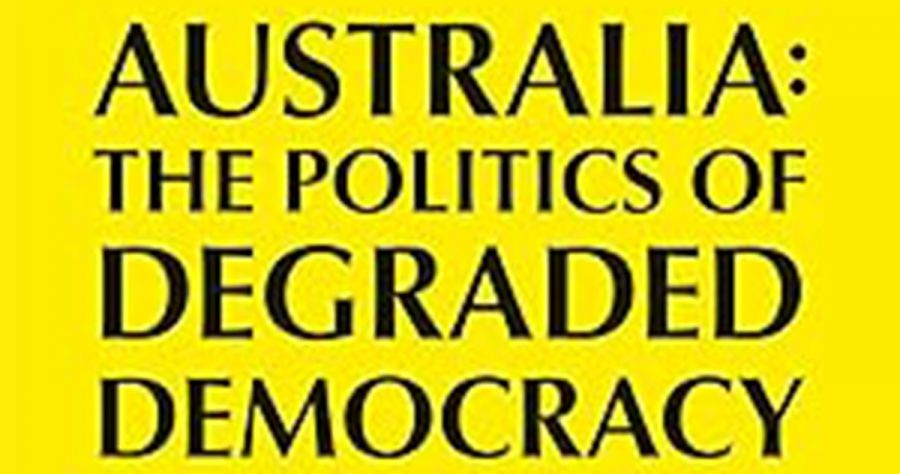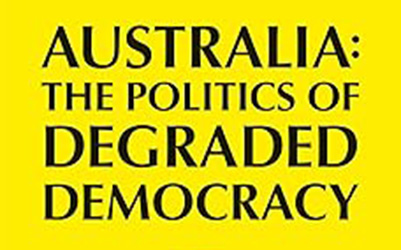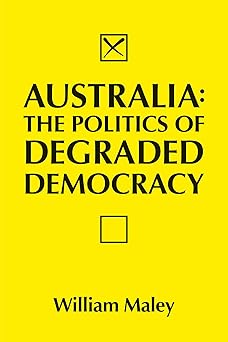
- Free Article: No
- Contents Category: Politics
- Review Article: Yes
- Article Title: Trust corroded
- Article Subtitle: The troubling state of Australian democracy
- Online Only: No
- Custom Highlight Text:
I write this review over the Australia Day long weekend, a few items from the national media stand out as exemplary reminders of how poorly Australians are being served by our political class. First, in an embarrassingly transparent nod to Donald Trump and Elon Musk’s juvenile Department of Government Efficiency (DOGE), Opposition Leader Peter Dutton appointed Senator Jacinta Nampijinpa Price to the new shadow ministry for government efficiency. Second, Dutton’s deputy Sussan Ley likened the First Fleet’s 1788 arrival in Australia to Musk’s delusional fantasies about occupying Mars. ‘Just like astronauts arriving on Mars,’ she told an Albury church congregation, ‘those first settlers would be confronted with a different and strange world, full of danger, adventure and potential.’ Around the globe, many are increasingly wary of the political trajectory of the United States in its current phase of advanced decadence, but for Australia’s alternative government, now is the time to cling to the sinking ship that is the American empire.
- Featured Image (400px * 250px):

- Alt Tag (Featured Image): Dominic Kelly reviews ‘Australia: The politics of degraded democracy’ by William Maley
- Book 1 Title: Australia
- Book 1 Subtitle: The politics of degraded democracy
- Book 1 Biblio: Australian Scholarly Publishing, $49.95 pb, 285 pp s
- Book 1 Cover Small (400 x 600):

- Book 1 Cover (800 x 1200):

Then, in a rambling counterfactual in The Australian, disgraced former public servant Mike Pezzullo argued that, given that this continent was always going to be occupied by European powers, First Peoples might consider themselves lucky that it was the British who did the colonising and dispossessing, rather than, say, the French, the Dutch, or the Spanish. Here, the problem was not so much the message – Pezzullo’s inane and dull argument is routinely wheeled out by right-wing culture warriors every January – as the medium. This is a man so discredited by his ethical breaches and partisanship as a department head that he was dismissed and later stripped of his Order of Australia, but whom the national broadsheet considers worthy of a pedestal from which he can lecture the nation.
Mindless mimicry of Trump’s America and tiresome culture war inanity are not the focus of William Maley’s worthy new book, Australia: The politics of degraded democracy, but they are symptoms of the degradation he outlines and dissects. Until recently Maley was Professor of Diplomacy at the Australian National University; the majority of Maley’s scholarship has concerned international relations, with particular emphasis on Afghan politics. He has now turned his attention to the deeply troubling state of Australian democracy.
The problems that Maley identifies will be recognisable to anyone who follows politics: the ineffectiveness of the Commonwealth Parliament as a deliberative body or a method of holding the executive to account; the decline of the major political parties as mass membership organisations responsive to the people they represent; the hollowing out of the public service; élite contempt for the rule of law; media outlets that only serve the interests of their wealthy owners, and their increasing displacement by social media, which may be even worse. Despite this familiarity, Maley performs an admirable service in contextualising the issues into a broader historical argument about how we find ourselves in such an unhappy situation.
Maley’s discussion of political parties is especially valuable. Despite the public’s obvious dissatisfaction with both sides of the traditional political divide, the Labor Party and the Liberal-National Coalition remain disproportionately entrenched in federal and state parliaments. This anomaly can be explained by the combination of three key systemic factors in Australian electoral politics: preferential voting, in which votes usually flow back to the major parties, even when they are manifestly unpopular; compulsory voting, in which growing political discontent is masked by artificially high voter turnout rates; and public funding of political parties, which props up increasingly moribund organisations to the tune of $3.386 per vote (as long as the candidate receives at least four per cent of the vote – another way the major parties reward themselves while disadvantaging newcomers and smaller players).
Alone, each of these policies may have its merits. Preferential voting allows people to vote more strategically and to avoid difficult choices between multiple candidates they would be comfortable electing. Compulsory voting probably leads to more widespread engagement in Australian elections. It discourages parties from simply ignoring entire segments of the population who don’t vote, as can happen when voting is optional. Maley notes that public funding of political parties was introduced in 1984 with the goal of reducing the risk that they become reliant on rich and powerful donors, who might then force them to adopt policies that favour corporate interests at the expense of the wider public. However, Australia’s political parties are flush with cash from union and corporate donors, as well as that provided by the public. For the major parties it is the best of both worlds, but democracy is the loser.
Despite the remarkable success of independent candidates at the 2022 federal election, these policy settings mean that major party parliamentary dominance continues. The combined Labor and Coalition vote in 2022 was sixty-eight per cent, yet they hold eighty-nine per cent of seats in the House of Representatives. This is plainly undemocratic, but few members of the media seem willing to consider that it might be a problem. In fact, they regard any change that might lead to minority government or a more diverse parliament as a recipe for instability and chaos. It is to Maley’s credit that he has attempted to put the issue on the agenda. Although clearly a political moderate, he is not frightened of genuine political reform, unlike so many of our political class.
Not all of Maley’s chapters are as interesting as this. Some have the stultifying feel of university textbooks, containing too much superfluous contextualisation to appeal to general readers. The most notable weakness of the book, however, concerns the malign influence of big money in Australian politics. Maley fails to give the mining and resources industry the scathing treatment it deserves with regard to Australia’s decades of failed climate policy. A subject worthy of a chapter – the outsized influence of the industry on politicians through lobbying and a revolving door between Parliament, the public service, and lucrative corporate roles – is brushed off in half a sentence. In a section on the Royal Commission into Misconduct in the Banking, Superannuation and Financial Services Industry, Maley blithely dismisses the notion that the regulatory capture found by Justice Kenneth Hayne may have contributed to the degradation of democracy. On the contrary, there is a widespread impression that the super-wealthy can easily avoid serious punishment for their crimes, whereas ordinary people are presumed guilty until proven innocent (as they were under Robodebt, a disgraceful episode to which Maley gives the kind of thorough consideration it deserves).
Overall, despite a tendency to wax nostalgic about a lost Menzian golden age, Maley is refreshingly honest about the failings of Australia’s political culture. Crucially, he has the correct target in his sights: political élites, especially those whose only interest is themselves, such as Mike Pezzullo and Scott Morrison. Too many commentators put Parliament House friendships ahead of their role in holding politicians to account, and are quick to join them in punching down on ordinary people as a way of hiding their own failures. Maley’s book reminds us that this kind of cynicism is corroding what little trust Australians have left in their democratic system.


Comments powered by CComment